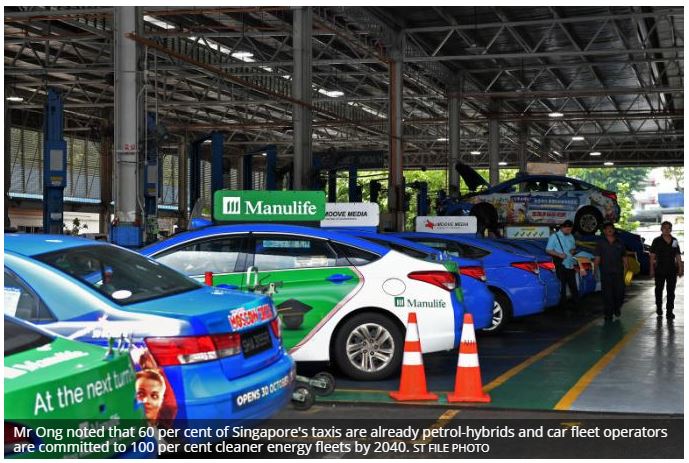No new diesel cars, taxis in Singapore; road taxes for EVs updated: Ong Ye Kung
SINGAPORE will cease new registrations of diesel cars and taxis from 2025, with all new car and taxi registrations to be of cleaner-energy models from 2030, said Minister for Transport Ong Ye Kung on Thursday.
He also announced further revisions to the road tax structure to bring down road taxes for mass-market electric vehicles (EVs). The additional registration fee floor for electric cars will also be lowered from S$5,000 to zero.
The road tax adjustments will specifically see the merging of current electric car road tax bands of 30-90kW and 90-230kW and subject them to the current road tax formula for the lower band.
Following these adjustments, a Hyundai Kona Electric will see its annual road tax fall from about S$1,400 to S$1,100, while the annual road tax for the Tesla Model 3 will drop from S$2,300 to S$1,500 as part of efforts to make road taxes for EVs comparable to those of internal combustion engine (ICE) models of a similar look and feel.
Speaking in Parliament on Thursday at the debate on the government’s sustainability plans, Mr Ong acknowledged concerns raised by car enthusiasts that the road tax schedule penalises big electric cars above 230kW. He illustrated this using the example of how an electric Porsche Taycan is subject to significantly more road tax than a Porsche Cayenne.
“I acknowledge the concerns. But these are all big luxurious cars, and I prefer to leave them alone for now. What is important is that we have now established the principles and policy for charging road tax on electric cars. As more models emerge, we will review the road tax schedule, with a view not to overcharge electric vis-a-vis ICE cars,” he said.
Meanwhile, the government will be ramping up the number of EV charging points installed, with plans for eight EV-ready towns with chargers at all HDB carparks by 2025. All new HDB carparks will also be required to have sufficient electrical capacity to support EV slow charging in 15 per cent of their car parking lots, with a minimum number of chargers installed in these lots. This requirement will also be imposed on new private buildings and existing buildings undergoing major redevelopment.
This is part of the Republic’s plan to have 60,000 charging points (comprising 40,000 in public carparks and 20,000 in private premises) throughout the country by 2030.
“Assuming one-third of cars are EVs by 2030, this translates into an EV-to-charging point ratio of about 5.1. This ratio is better than many public estimates of the optimum ratio, which ranges from 5:1 to 10:1.”
Mr Ong also acknowledged that while having high-powered “fast” charging points is preferred, the key to unlocking more charging facilities is to not insist on this, given that it would require a major upgrading of almost all the power substations and grid infrastructure in Singapore.
“It would be costly, time-consuming, stall the development and expansion for charging infrastructure, and severely impede the adoption of EVs,” he said.
“We can move much faster in making charging points available if we accept that for most users, instead of high-powered ‘fast’ charging, ‘slow’ or ‘overnight’ charging is alright,” the minister added.
For fleet operators who need fast charging to support their business operations, Mr Ong said fleet operators need to be prepared to invest in building up the infrastructure to support their operations.
He also noted that 60 per cent of Singapore’s taxis are already petrol-hybrids and car fleet operators are committed to 100 per cent cleaner energy fleets by 2040.
On the question of charging farms, these are issues that the government and fleet operators will need to discuss and work out, he said.
The eight EV-ready HDB towns by 2025 – where every HDB carpark will be fitted with charging points – are Ang Mo Kio, Bedok, Choa Chu Kang, Jurong West, Punggol, Tengah, Queenstown, and Sembawang.
“By the 2030s, we will strive to make every HDB town an EV-ready town,” said Mr Ong.
For non-landed private residences such as condominiums, the government is introducing an EV Common Charger Grant to catalyse implementation. This is part of the S$30 million allocation announced in the Budget to kickstart the build-up of shared charging infrastructure.
Condominiums will be able to apply for the grant to defray part of the cost of installing a charger, subject to a quantum cap. This will be made available to the first 2,000 chargers installed from July 2021.
Finally, the newly formed National Electric Vehicle Centre (NEVC) will spearhead the drive to promote wider EV adoption. [NEW]In addition to planning for the expansion of the nationwide EV charging infrastructure, the NEVC will also lead efforts to review EV regulations and standards.
Source: https://www.businesstimes.com.sg/government-economy/singapore-budget-2021/no-new-diesel-cars-taxis-in-singapore-road-taxes-for-evs


 Thailand
Thailand




